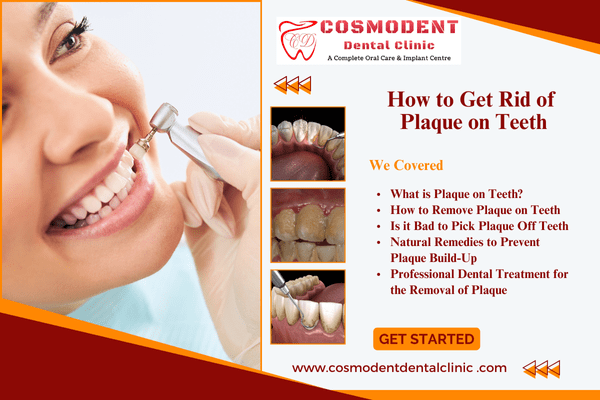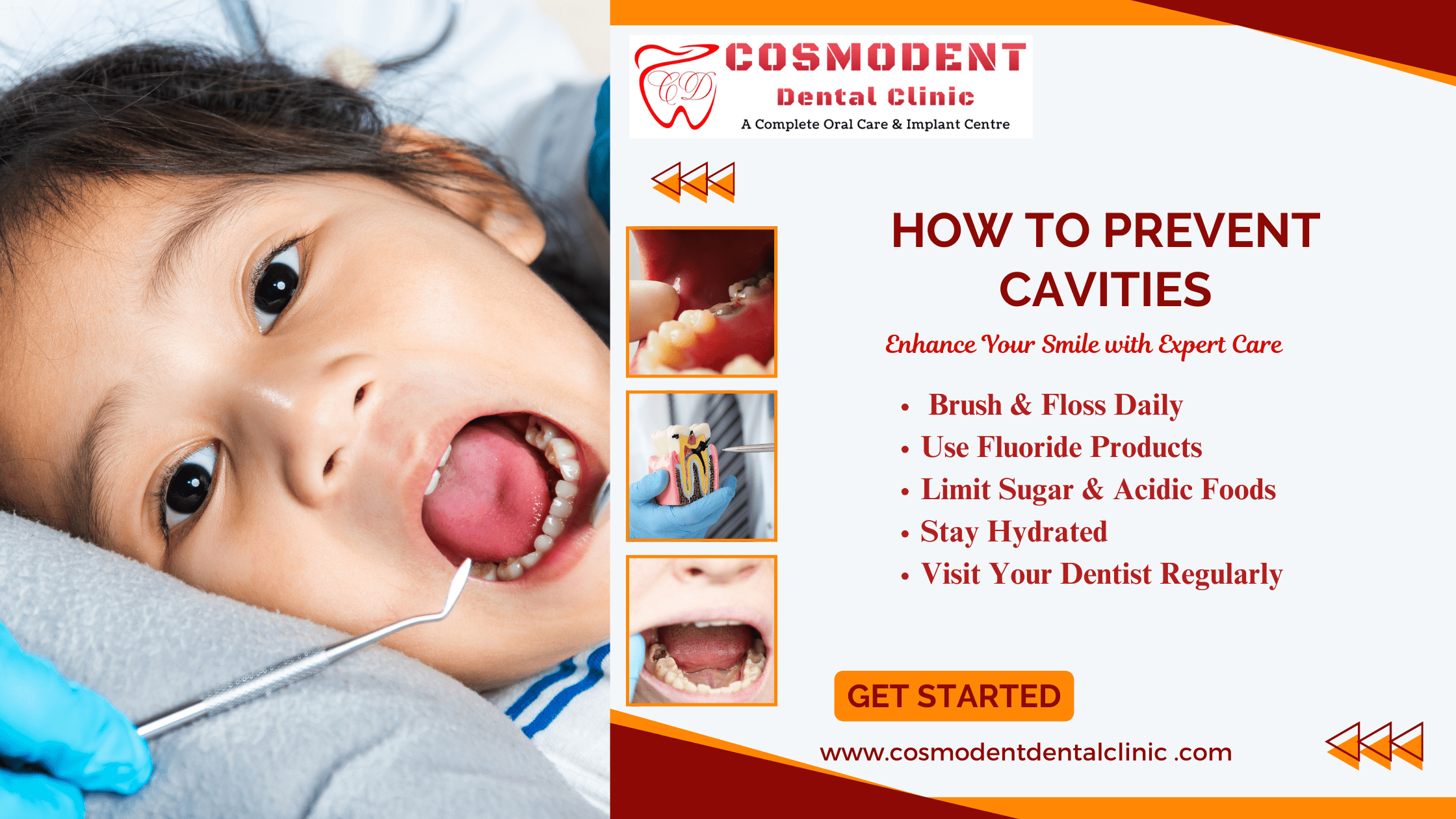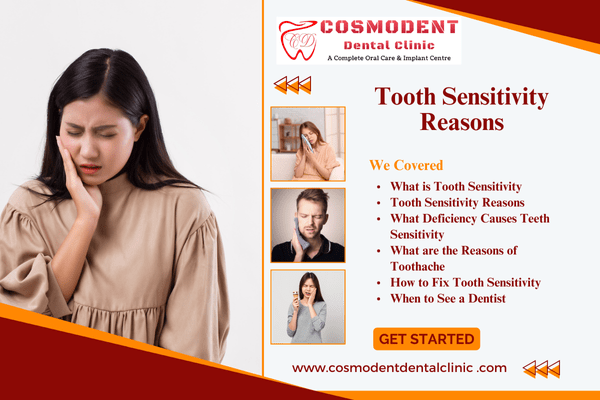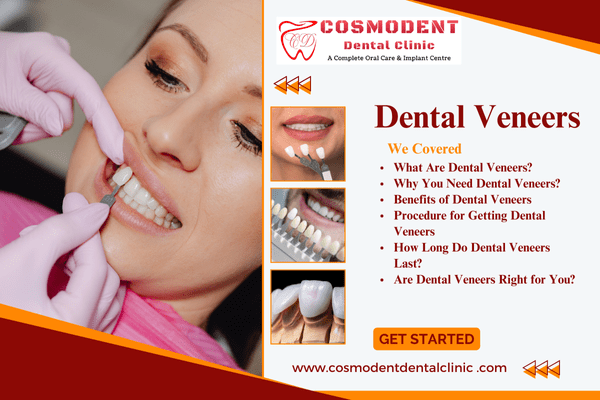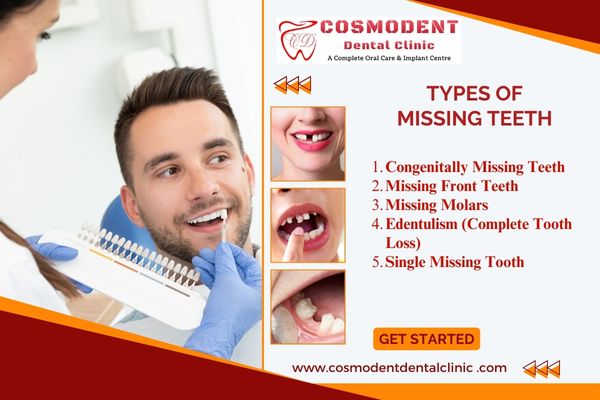Discover the top 5 Oral Health Problems that can impact your overall well-being. Learn how to prevent and treat these common issues at cosmodent
Introduction:
Oral fitness is an integral part of our basic well-being, yet it regularly gets overlooked. Dental issues can cause pain, discomfort, or even affect your vanity. Understanding the most common oral health problems will assist you in taking preventive measures and are trying to find timely remedy. In this blog, we’re going to explore the 5 most prevalent oral health problems you want to realize approximately, helping you hold a healthy and assured smile.
What are the causes of poor oral health?
Poor oral fitness may be due of various factors. Inadequate oral hygiene practices, including rare brushing and flossing, result in plaque buildup and enamel decay. High-sugar and acidic diets contribute to tooth erosion and cavities. Tobacco use and immoderate alcohol intake increase the threat of gum disease and oral cancer. Dry mouth, on account of certain medications or medical situations, reduces saliva production, which enables the neutralization of acids. Poorly controlled persistent illnesses like diabetes can also negatively affect oral health. Additionally, genetic elements and lack of normal dental checkups in the U.S.A. Play significant roles in the development of oral health troubles.
1. Oral Health Problems: Tooth Decay (Cavities)
What is Tooth Decay?
Tooth decay, commonly known as cavities, is one of the most widespread oral health problems. It occurs when the enamel, the hard outer layer of your teeth, gets damaged due to acid produced by bacteria. This acid results from the bacteria feeding on sugars and carbohydrates left on your teeth.
Causes of Tooth Decay
Poor Oral Hygiene: Inadequate brushing and flossing can leave food particles on your teeth, leading to plaque buildup.
- Diet: High-sugar and acidic foods and beverages contribute significantly to tooth decay.
- Dry Mouth: A lack of saliva, which helps neutralize acids, can increase the risk of cavities.
- Bacteria: The presence of harmful bacteria in the mouth can accelerate the decay process.
Symptoms of Tooth Decay
· Toothache or pain, especially when eating or drinking something sweet, hot, or cold
· Visible holes or pits in your teeth
· Brown, black, or white staining on the surface of a tooth
· Sensitivity to hot or cold
Prevention and Treatment
Preventing tooth decay involves maintaining good oral hygiene, such as brushing twice a day with fluoride toothpaste, practicing proper flossing technique, and visiting your dentist regularly for cleanings and check-ups. Reducing your intake of sugary and acidic foods can also help. If you do develop a cavity, treatments include fillings, crowns, or root canals, depending on the severity.
2. Oral Health Problems: Gum Disease (Periodontal Disease)
What is Gum Disease?
Gum disease, also known as periodontal disease, is an infection of the tissues that surround and support your teeth. It’s a major cause of tooth loss in adults. There are two predominant stages: gingivitis (milder and reversible) and periodontitis (extra-excessive and potentially irreversible).
Causes of Gum Disease
Plaque Buildup: Plaque that isn’t removed can harden into tartar, leading to gum irritation and inflammation.
- Smoking: Tobacco use is a substantial threat component for gum sickness.
- Poor Oral Hygiene: Neglecting right brushing and flossing can cause plaque accumulation.
- Genetic Factors: Some people are more prone to severe gum disease due to genetic factors.
Symptoms of Gum Disease
- Red, swollen, or soft gums
- Bleeding gums throughout brushing or flossing
- Receding gums
- Persistent bad breath
- Loose or shifting teeth
- Prevention and remedy
Prevention and Treatment
Good oral hygiene practices, which include normal brushing and flossing, are crucial in stopping gum disease. Quitting smoking and consuming wholesome foods can also help. Treatment varies depending on the stage of gum ailment. For gingivitis, expert hygiene and advanced oral care are generally sufficient. Dental caries might also require more competitive remedies, including root canals, braces, antibiotics, or maybe surgical operations.
3. Oral Health Problems: Tooth Sensitivity
What is Tooth Sensitivity?
Tooth decay is a not-unusual circumstance in which your tooth reacts to warm, cold, candy and acidic ingredients or drinks. This trouble is generally caused of an exposed tooth; that’s a substance underneath the gums.
Causes of Sensitivity
- Enamel loss: Over time, acidic food and drinks can erode the enamel.
- Recession: Receding enamel can reveal dental plaque, causing wear and tear.
- Teeth-whitening products: Some humans enjoy sensitivity after the use of teeth-whitening products.
- Too much brushing: Vigorous brushing can damage tooth and cause touchy gums.
Symptoms of Tooth Sensitivity
- Sudden sharp ache when taking warm, cold, candy, sour food or drink
- Struggled as breathed in the bloodless air
- Sensation when brushing or flossing
Prevention and Treatment
Use a tender toothbrush to save your teeth decay, and keep away from over-toothing. Using a toothpaste designed for touchy tooth can help alleviate signs. Avoiding acidic foods and drinks can also protect your teeth. If the sensitivity persists, see your dentist, who might also advise remedies including fluoride gel, desensitization, or bonding.
4. Oral Health Problems: Bad Breath (Halitosis)
What is Bad Breath?
Bad breath, or halitosis, is an unpleasant Odor coming from the mouth. It can be a temporary issue or a chronic problem. While it’s often caused by poor oral hygiene, it can also indicate underlying oral health problems.
Causes of Bad Breath
Poor Oral Hygiene: Bacteria buildup on your teeth, gums, and tongue can produce foul-smelling compounds.
- Diet: Certain foods, like garlic and onions, can cause temporary bad breath.
- Dry Mouth: Saliva helps cleanse your mouth, and a lack of it can lead to bad breath.
- Medical Conditions: Respiratory infections, sinus problems, gastrointestinal issues, and some diseases can contribute to halitosis.
Symptoms of Bad Breath
- Unpleasant Odor from the mouth
- Bad taste in the mouth
- Dry mouth or dry throat
Prevention and Treatment
Maintaining good oral hygiene is key to preventing bad breath. Brush and floss daily, clean your tongue, and stay hydrated. Chewing sugar-free gum can stimulate saliva production. If bad breath persists despite good oral hygiene, visit your dentist to rule out underlying oral health problems. They may recommend professional cleaning, treatment for gum disease, or referral to a medical specialist if necessary.
5. Oral Health Problems: Oral Cancer
What is Oral Cancer?
Oral cancer includes cancers of the lips, tongue, cheeks, floor of the mouth, hard and soft palate, sinuses, and throat. Early detection is critical for successful treatment. Oral cancer can be life-threatening if not diagnosed and treated early.
Causes of Oral Cancer
· Tobacco use: Smoking and chewing tobacco are principal hazard factors.
· Alcohol consumption: Risk will increase with heavy alcohol intake.
· Human papillomavirus (HPV): Some styles of HPV are related to oral most cancers.
· Sun Exposure: Prolonged solar exposure can lead to oral cancer.
· Age and intercourse: Oral most cancers are extra commonplace in guys and those over 50 years of age.
Symptoms of Oral Cancer
· Persistent unhealed oral ulcers
· Wrinkled or thickened in the front
· White or yellow scabs masking the anus, tongue, tonsils, or mouth
· Difficulty chewing, swallowing, or shifting the mouth or tongue
· Numbness of the mouth or tongue
· Hoarseness or continual sore throat
Prevention and Treatment
Avoiding tobacco and limiting alcohol consumption are crucial preventive measures. Protect your lips from the sun with SPF lip balm Regular dental tests are crucial, as dentists can frequently spot early signs of oral cancer. If oral cancer is suspected, a biopsy is performed. Treatment may include surgery, radiation therapy, and chemotherapy.
Conclusion:
Maintaining good oral health is crucial on your typical well-being. By knowing and handling these commonplace oral fitness troubles—tooth decay, gum disease, tooth sensitivity, bad breath, and oral cancer— you can take the first steps to conquer your protective teeth and gums. Regular dental checkups, right oral hygiene practices, and a healthy lifestyle are your best defenses against these problems. Don’t let oral health problems hold you back from smiling confidently. Contact us now to get rid of oral health problems Start by browsing our tips and advice on oral health problems today. Your smile will thank you!

